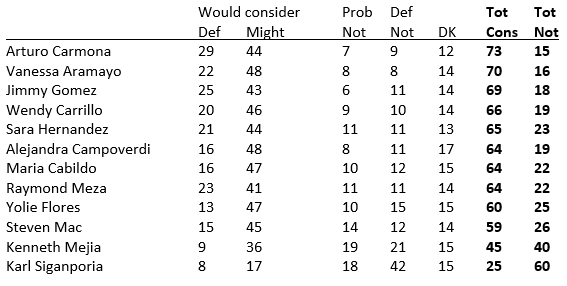(Originally posted at NCLR.org)
Today, NCLR (National Council of La Raza) released a national poll of Latino voters focused on their experiences in the workplace, including health, safety and wage issues. [TOPLINES HERE and DECK HERE]
The poll, administered by the polling firm Latino Decisions, surveyed 700 respondents between May 12-25, 2017. The poll is significant as it comes on the heels of proposed budget cuts at the Department of Labor (DOL) that would affect the ability of the agency to effectively enforce violations and provide job readiness programs to train workers.
Among the poll’s findings are that foreign-born, predominantly Spanish-speaking and low-income Latino voters (household earnings of less than $40,000 a year) face serious challenges in the workplace, including lack of orientation or training that would prepare them for the job, fear of retribution at work if they report health, safety, or pay problems and elevated incidence of health, safety and wage-related violations. The poll results also show that despite experiencing these issues in the workplace, Latinos have very low levels of reporting them or filing a claim.
“These poll numbers reinforce how essential it is for the DOL to uphold its mission to improve and protect the welfare and workplace conditions of American workers, and is a clear rebuke to efforts that are underway to cut by 21% the Department’s funding for critical job training programs and enforcement. Weakening DOL will have a devastating impact on Latinos, who are the largest and fastest growing segment of the American workforce, projected to make up one in three American workers by 2050,” said Lindsay Daniels, Associate Director, Economic Policy, NCLR.
Among other key findings in the poll are that nearly one-quarter of Latino workers receive no orientation once they begin employment and receive no training about workplace rights or safety. That number rises even higher—one in three—for lower income workers. Latino workers also experience a high level of retribution—being treated differently, punished or fired—when raising concerns about pay, health or safety. Of those surveyed, 15% of Latino voters say this has occurred, including 17% of predominantly Spanish-speaking Latinos and 21% of low-wage workers. In addition, one-third of all Latino workers surveyed have known about a possible health or safety risk in their workplace.
“In this political climate, many in the Latino community fear interactions with government officials, even when those officials exist to enforce workplace rights. Harmful rhetoric and actions empower unscrupulous employers to steal wages from low-wage workers, cut corners that result in unsafe workplaces and retaliate against workers who speak up. Federal, state and local enforcement agencies must make it clear that exploitation of vulnerable workers will not be tolerated,” added Rachel Deutsch, Senior Staff Attorney for Worker Justice, Center for Popular Democracy.
For full poll results, visit http://publications.nclr.org/handle/123456789/1734 and for additional information or interview requests, please contact: Camila Gallardo, Assistant Director, Communications, NCLR at [email protected] or (305) 215-4259.
Poll Methodology:
On behalf of NCLR, Latino Decisions interviewed a total of 700 Latino registered voters between May 12-25, 2017. Interviews were conducted in English or Spanish, according to the respondent’s choice. Surveys were completed using a blended sample that included live telephone interviews on landlines and cell phones, and online surveys. The survey carries a margin of error of +/- 3.7 percentage points. The poll was conducted with the support of the Public Welfare Foundation; the views and conclusions expressed here are those of NCLR alone and do not necessarily reflect the opinions of their funders.


